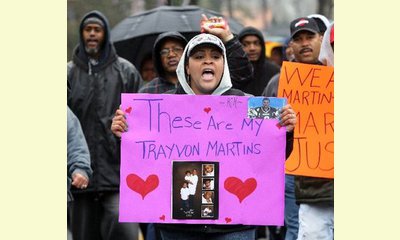|
|
Bloomfield opinion: Moving to culture of peace
an article by Madelyn Hoffman, guest columnist, Bloomfield Life
On Saturday, March 31, hundreds marched and rallied in Newark [US] at an event organized by the People’s Organization for Progress, calling for justice in the case of Trayvon Martin. While listening to the speakers at City Hall, connections became clear between the Travyon Martin case and New Jersey Peace Action’s work to prevent war and move the money saved to programs that fund community needs.

Taylor-Schenck of Plainfield carries a sign that reads "These are my Trayvon Martins" during a hoodie march for Trayvon Martin
credit: Jody Somers/For The Star-LedgerTamara
click on photo to enlarge
At issue in the Trayvon Martin case is the "Stand Your Ground" law in Florida. Twenty three states have similar laws, laws which feed the mentality that if "I have the gun, I can set the rules." Since 2005, when the law was signed, the annual number of so-called justifiable homicides has tripled.
George Zimmerman claimed he shot Trayvon in self-defense. If he can prove that "he felt threatened" (not that he was actually threatened), the law will be on his side. Now that Zimmerman was arrested and charged with second-degree murder, perhaps we’ll learn the true story. But it took days and days of protests and thousands of signatures on petitions before law enforcement in Florida took a second look at what happened that fateful night.
Let’s look at the bigger picture. In 2009, guns took the lives of 31,347 Americans in homicides, suicides and unintentional shootings. This is the equivalent of more than 85 deaths each day and more than three deaths each hour.
In the first seven years of the U.S.-Iraq War, more than 4,400 American soldiers were killed. However, almost as many civilians are killed with guns in the United States every seven weeks, according to the Legal Community Against Gun Violence.
Our culture of violence needs to be transformed to a culture of peace.
The Trayvon Martin march and rally took place just four days before the 45th anniversary of Dr. Martin Luther King’s speech, "Beyond Vietnam: Why I Oppose the Vietnam War." Dr. King delivered that speech one year to the day before his assassination on April 4, 1968.
Much of Dr. King’s speech is relevant today, but these words ring loudest: The greatest purveyor of violence in the world today is my own government. . .
Tax Week 2012 is a perfect time for us to think about how the federal government is spending about 50 percent of our taxes on war. According to the National Priorities Project, the national cost of the wars in Iraq and Afghanistan alone stands at $1.32 trillion; the New Jersey cost, at $67 billion.. . .
U.S. foreign and domestic policies have fostered a political climate based on the premise that "might makes right." But just because I am strong enough to beat you up in a fight, doesn’t mean I should. It might be an even greater show of strength for me to restrain myself physically and instead talk to you, my adversary, about our differences. . . "
There comes a time when silence is betrayal." Dr. King stated.
The writer is executive director of NJ Peace Action, based in Bloomfield.
|








|
DISCUSSION
Question(s) related to this article:
Can peace be guaranteed through nonviolent means?,
* * * * *
Latest reader comment:
We have the advantage of an independent evaluation of the Nonviolent Peaceforce initiative in the Philippines conducted by Swisspeace. The evaluation is very favorable, although in the end, as one reads through it, gets the impression that such initiatives can help but cannot bring peace by themselves.
Here is the executive summary:
Nonviolent Peaceforce in the Philippines can look back at more than two years of unique, relevant contributions and constructive engagement in one of the most difficult, political and volatile, contexts to work in: Being the only international non-governmental organization working with and living in close proximity to the most conflict-affected population in Mindanao, NP in the Philippines was able to support and enhance local structures of cease-fire monitoring, early warning, cross-community dialogues, human rights protection, to offer civilian protection and help to reduce the high levels of community violence.
The accepted offer to NP in the Philippines in late 2009 by the conflict parties GRP and the MILF to join the International Monitoring Team1 (IMT) and its Civilian Protection Component is a direct expression and result of its successful contributions to non-violence and violence reduction of the last two years.
To keep up the important work of NP’s project in the Philippines in the years to come, it is essential to ensure that the activities and objectives of NPP are based on a strategically and conceptually sound footing. This seems even more important given that NPP is going through a remarkable consolidation and expansion phase at the time of report-writing.
The re-focus on its key mandate, strengths and strategic advantages in Mindanao gives NP the opportunity to further enhance its unique work in the area of nonviolence, peacekeeping and peacebuilding.

|
|









